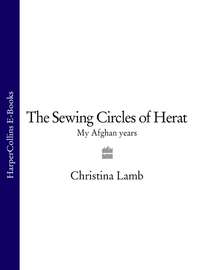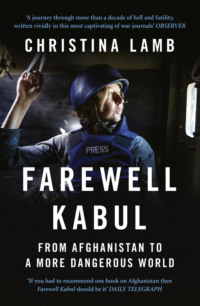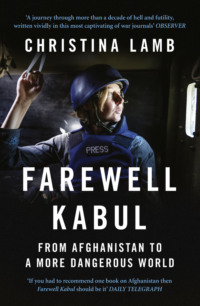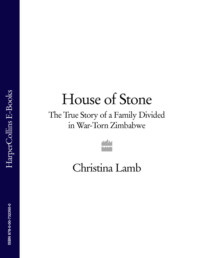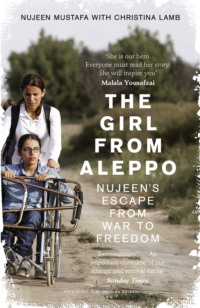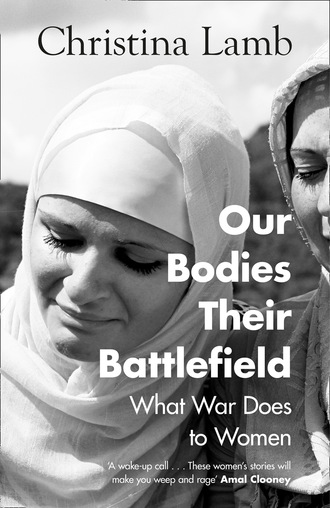
Полная версия
Our Bodies, Their Battlefield
Two years after the abduction of the girls, the dusk vigil still continued every evening in Unity Square. The swallows still came out in their V formations but the protesters had shrunk to a small huddle of perhaps a dozen, wearing red Bring Back Our Girls badges, and a stack of plastic chairs stood untouched. A few more drifted in from work and some passing motorists honked in solidarity.
‘No one is giving up,’ insisted Yusuf Abubakar, the sit-out coordinator. His megaphone wasn’t working so he shouted the usual chant:
When shall we stop?
Not until our girls are back and alive!
When shall we stop?
Not without our daughters!
Various matters were discussed such as who could provide refreshments for a forthcoming candlelit vigil in memory of the slain Buni Yadi boys. As always the session ended with everyone singing John Lennon’s ‘Give Peace a Chance’ reworded to say ‘All we are saying – bring back our girls. Now and alive!’
Among those gathered was a teenage girl, Maryam, slim and still as a tulip, and her mother Fatima, their faces stricken. Maryam told me she had been at Buni Yadi school along with her beloved sixteen-year-old elder brother Shoaib on the night of 24 February 2014 when Boko Haram attacked. ‘They herded all the girls into the mosque and told us that going to such school was wrong and if they caught us again they wouldn’t spare us. Then they started shooting boys in the head in front of us.’
Others had their throats slit and they heard the screams. She never saw her brother again. ‘He wanted to be an architect,’ said her mother Fatima. ‘I fainted when I heard the news.’
Fatima was paying for Maryam to go to school in Kaduna which she thought was safer. But Maryam cried as she told me, ‘I can’t concentrate because I keep thinking of my brother and what they did to those boys. I know my mum is sacrificing for me to go to school and I didn’t want my education to stop but I don’t know what to do. I have nightmares every night and they fill my mind.’
The next morning I met up with Esther Yakubu. She looked as if she had aged ten years in the past two and told me she felt as if she was living in a kind of limbo. ‘I can’t sleep, I can’t breathe,’ she said. ‘My other daughter refuses to go back to school because she is scared.’ Some of the Chibok parents had committed suicide, she said. No one had offered them counselling. ‘The government just gave us dress material and rice,’ she shrugged. ‘What good is that?’
She still had faith her daughter would be returned. ‘I believe she’s alive,’ she said. ‘I used to dream that she was back. Once her sister woke in the night and screamed “Dorcas is here!” She dreamt she came back and was making herself up. She loved to do that.
‘If she’s dead I would know,’ she added.
The international attention had surprised them and given them hope the girls would be quickly recovered, so they were mystified at the failure. ‘We heard the Americans have satellites that could see even a man walking in a street in Baghdad or a goat on a hill in Afghanistan,’ said Esther. ‘How would they not see all those girls?
‘What I think is the government was not serious. If they had been the children of the elite, they would have been found.’
The military checkpoint just outside Maiduguri airport had a large Wanted poster covered with menacing faces of dozens of armed Boko Haram fighters, in the centre of which was the leering face of Shekau. The soldiers standing behind piles of sandbags looked surly, not surprisingly perhaps as they were poorly paid and equipped – partly it was said because their commanders were pocketing the funds or selling off their equipment to the terrorist group.
I had flown to the birthplace of Boko Haram to meet some of their former hostages to learn what it was like to be a girl like Dorcas in their captivity. On the flight I sat next to Professor Abba Gambo who was head of the crop-production department at the university. He told me all eleven of his brothers had been killed, including one who was shot in front of him. He blamed Boko Haram on high levels of poverty, illiteracy and climate change, which meant the area was getting just three months of rain, with Lake Chad shrinking and crops declining. He pointed outside the window at the parched brown land.
I was not the only foreigner on board. Denise Ritchie was a feisty blonde barrister and anti-sexual-violence campaigner from New Zealand who told me she was carrying suitcases of bras and knickers she had collected to give to the abducted women. First, I thought she was mad then I felt humbled that someone would save their money to fly halfway round the world to try to bring a little dignity to women she had never met.
We both checked into Satus guesthouse which had been recommended as safe because an army unit was stationed there, though this may have been a questionable advantage given they were the main target. The website showed Scandinavian-style rooms of stripped wood and white Egyptian cotton duvets – but the rooms were brown and dank with stained candlewick bedspreads. I accosted the manager and he laughed and told me those were pictures of another hotel which he had liked so had cut and pasted.
Maiduguri was much livelier than on my previous visit two years earlier in 2014. Then it was under curfew having recently been attacked. Now everyone seemed to be selling something. On the street young men were playing table football and people grilling skewers of river fish and tiny sparrow-like birds with red beaks called quelea, which were sold in paper and crunched whole.
Hundreds of thousands of people from surrounding villages and towns that had been taken over by Boko Haram had fled into the city. Twenty-five camps had sprung up to house them all. Among them were thousands of girls who had escaped or been rescued from Boko Haram. While all the international focus was on the Chibok girls, it soon became clear that their abduction was just the tip of the iceberg.
‘They put their dirty hands over our mouths and made us show them our breasts,’ said Ba Amsa, who, like Esther’s daughter Dorcas, had been sixteen when she was taken prisoner by Boko Haram. ‘You couldn’t resist because they had guns and if you did, they took you to the bush and killed you.’
She was from a small town called Bama which had been attacked several times by Boko Haram then captured in September 2014, five months after the Chibok abductions.
Even by their murderous standards it was bloody. Afterwards Boko Haram put out a video showing their gunmen mowing down civilians lying face down in a local school dormitory lined with bunk beds. Most appeared to be adult men. There were so many corpses that the gunmen had difficulty stepping between them to finish off those still twitching.
‘We have turned the floor of this hall red with blood, and this is how it is going to be in all future attacks and arrests of infidels,’ said the group leader in a message. ‘From now killing, slaughtering, destructions and bombing will be our religious duty anywhere we invade.’
As Boko Haram moved in, people tried to flee. Ba Amsa had a limp because of childhood polio so could not run fast. ‘They caught me and my sister and took us to a kind of prison of women where they kept us three months, making us do lessons on Islam.
‘It was a place for Boko Haram fighters to choose wives. They would tell us men are coming to look at you and made us stand up and show our breasts then they would pick five or ten of us. More than twenty girls had been taken away before they came for me.
‘The man who picked me was someone I knew from Bama and we stayed in a house of people they had killed. He was young and didn’t seem to know anything about religion. He told me anyone who joined Boko Haram would go to Paradise.’
When I asked how he treated her, she looked down at the ground. ‘I couldn’t resist him,’ she replied. ‘He was armed. One day the army came and bombed the village and I managed to run away even though I was pregnant.’
I met Ba Amsa at Dalori camp which was based in a former technical college on the edge of town on dusty ground dotted with bare baobab trees. Dalori was the largest camp with around 22,000 people and also the oldest. It was said to be the best equipped and had rows of white tents, but it seemed a miserable place, with just one tap where barefoot people were queuing to get water. The tents were no escape from the 40-degree heat. Rations were just rice and a monthly bar of soap – I later spotted the flour, cooking oil and beans they were supposed to get on sale in the market just down the road.
Camps were organised by place to try and keep communities together and most people in Dalori were from Bama. Ba Amsa was attending a workshop organised by a local group for women and girls who had escaped Boko Haram and wanted to speak out. It was in a small trailer set up with rows of desks at which sat forty women and girls, several holding babies even though they looked like children themselves. It was sweltering.
Ba Amsa, who was by then eighteen, was nursing a baby boy – her four-month-old son Abuya who had been born in the camp. She had been reunited with her parents who were also in the camp. Her other siblings – two elder brothers, one younger and a younger sister – were all still missing.
Ba Amsa said she was lucky because her family still supported her. But she worried about the future of her son. One day the elder sister of her Boko Haram husband came to find her, wanting to give the boy a name.
‘In our tradition the husband names the baby but I told her he had no right after what he did. This baby is a reminder of all the pain but this child doesn’t even know of its own existence so it has no blame,’ she said. ‘All the bad things that happened to me are because of the father not him. This child is innocent.’
It didn’t seem so to me at first but as I met more girls I realised she was right about being lucky. Most of the girls in the workshop were ostracised by their community and made to stay in a separate tent for what they called Sambisa wives.
Among them was Raqaya al Haji, who at thirteen was already four months pregnant by a Boko Haram terrorist she had been forced to marry.
When Boko Haram came for her, she was just eleven and about to start high school. ‘I was asleep in my parents’ house in Bama when two men with guns forced their way in and took me,’ she said. ‘I knew who they were as they were from the neighbourhood and everyone knew they were members of Boko Haram.’
They took her to a village called Bu Nafe and made her one of three wives of a young fighter called Khumoro even though she was so young she had not yet started her periods.
‘If I refused they would make me a concubine,’ she said. ‘I knew if I ran away there were people on the roads who would take us back and kill us.
‘He was a troublesome man,’ she added. ‘If I resisted him he forced me to drink blood. Often they made us gather and to watch women be lashed or have their heads broken with rocks for adultery.
‘Sometimes Khumoro went off to fight and I thought about running away but I knew Boko Haram had people on the roads and would kill me if they found me.’
Eventually she became so desperate that in December, after more than a year and a half of captivity, she pleaded with him to let her go to visit her sick grandmother.
‘I fled. I walked at night so they wouldn’t see me then hid in the day. I was dizzy from no food or drink. It took me three nights to get back to Bama. It was under the control of the Nigerian army and they kept me for a while … Then in January they brought me here to the camp. I was so happy at first then I realised no one would talk to me. They call us annova which means epidemic or bad blood.’
‘People believe the women who were abducted have become sympathisers and had a spell cast over them,’ explained Dr Yagana Bugar, a lecturer at Maiduguri University who also came from Bama and had researched a report on the stigmatisation of these women. ‘Because camps are organised by village, everyone knows your story and no one wants to associate with those taken by Boko Haram. So after everything else they have been through they end up ostracised in camps and can’t go back to their original places.’
In other words they were victims twice over. Or maybe three times if you included what happened in military custody.
Some had been so brutally raped they had fistula, a tear in the walls between the vagina and the bladder or rectum which meant they leaked urine or faeces and could barely leave their tent because they reeked. Others had been infected with HIV by their captors and some had tried to abort their own babies or been forced to by their families. What they were going through mentally, I couldn’t begin to imagine.
Then another girl came forward. Zara Shetima, at eighteen, had a fine-boned beauty, carefully plaited hair, and an adorable twenty-month-old baby girl she had named Kellu Kariye.
‘The insurgents came to my village in Bama and told my father they wanted to marry me,’ she said. ‘I refused so they came back with guns and said they would kill me and my father unless I agreed. They brought 2000 naira [£7] as dowry.’
When the village was captured and others ran away, the man kept her there in her family house. ‘He was short and dark in complexion,’ she said.
Asked how he treated her, first she said fine. But there was a hollowness in her eyes. ‘He forced himself on me, they all did,’ she added, looking down. ‘It was very hard.’
Tears started streaming down her face. Little Kellu took the end of her mum’s red scarf and dabbed at the tears. ‘If I resisted they made me watch him slaughter other people.’
That was not the end of the story. ‘Some others came and said we should move and he refused so they shot him,’ she said. ‘Then they told me to marry another one. When I refused they took my sister.’
Later, when a military jet bombed the villages, she took the opportunity to flee, scrambling through thorny scrubland. She had no idea what had happened to her sister and the rest of her family.
‘Nobody is taking care of me,’ she said. ‘I am alone here. Often I think it would be better to die but who would look after Kellu?’
Apart from the twice-daily ration of rice, and monthly bar of soap, she got no other food or help. To supplement it, she weaved traditional prayer caps which took a month to complete and sold for just 2–3000 naira (£7–10) each.
There was only one other way girls like Zara could afford any more food. All the aid workers told me sexual abuse in the camps was rife. The superintendent of one camp was on trial for raping children.
Some women found the conditions in the camps so unbearable they preferred to live outside, begging on the streets.
Back in Abuja, I went to see Brigadier General Rabe Abubakar, spokesman for the Nigerian military. There was a power-cut and his office was sweltering. He told me that Boko Haram was now ‘extremely weak because our military activities are really punching on them’ and that the army had rescued ‘thousands of girls’ – more than a thousand that January alone. It seemed surprising that none of them were Chibok girls, particularly given all the international resources deployed to find them.
He suggested that the international attention had made things worse for the girls. ‘You have turned those girls into their crown jewels,’ he shrugged.
Dr Andrew Pocock, who had been British High Commissioner in Nigeria at the time of their abduction, later admitted to me that one large group of girls had been located early on in the search. ‘A couple of months after the kidnapping, fly-bys and American eye-in-the-sky spotted a group of up to eighty girls in a particular spot on the Sambisa forest around a very large tree they were calling the Tree of Life, along with evidence of vehicular movement and a large encampment.
‘They were there for a while – six weeks – and the question to Whitehall and Washington was what to do about them and answer came there none.’
Despite all the fervour western leaders had shown round the BBOG hashtag, there was no appetite to send in their own boots on the ground. ‘A land-based attack would have been seen coming miles away and had the girls killed,’ explained Pocock. ‘An air-based rescue such as flying in helicopters or Hercules would have required large numbers and meant a significant risk to the rescuers and even more so to the girls. You might have rescued a few but many would have been killed.
‘My personal fear always was what about the girls not in that encampment?’ he added. ‘Eighty were there but more than two hundred were taken. What would have happened to them?
‘It’s perfectly conceivable that Shekau would have appeared on one of his videos a week later, saying “Who told you you could try and free these girls? Let me show you what I’ve done to them …”
‘So you were damned if you did, damned if you didn’t,’ he said. ‘They were beyond rescue in practical terms.’
Far away in Australia, Dr Stephen Davis could not believe it was so hard to find more than 200 girls. He had been involved in hostage negotiations in the oil-rich Delta area as well as previous peace negotiations with Boko Haram so made some calls to commanders he had got to know.
‘Three calls, three commanders,’ he said. ‘They said, “Of course we know who has the girls.” So they spoke to some of those who had them and they said they might be prepared to release them.’
On the strength of that Davis went to Nigeria in April 2015 and spent three months in Boko Haram territory in the north, his white skin making him ‘stand out like a lighthouse’.
He asked for proof of life. They gave him videos of girls being raped – the ones I had seen. They also told him that eighteen of the girls were ill so he suggested taking them off their hands. Three times a deal was almost concluded. ‘Once it got as far as them taking some of the girls to a village for a handover but then another group took them, sensing a money-making opportunity.’
Frustrated and facing threats, eventually Davis had to leave for medical reasons – he had terminal cancer.
He insisted that the Boko Haram camps were easy to spot. ‘It’s not hard to see where the five or six main camps are,’ he said. ‘I can see them on Google Earth. You tell me the Americans, British and French can’t see them from satellite tracking or drones?
‘Meanwhile every week Boko Haram set off from those camps to slaughter and kidnap hundreds more girls and young boys,’ he added in frustration. ‘How many girls have to be raped and abducted before the West will do anything?’
In June 2016, shortly after my second trip, another video of the girls was released. In front of several rows of girls in floor-length robes, some seated and others standing, stood a masked militant in camouflage holding a Kalashnikov. ‘We still have your girls,’ he declared. ‘The Nigerian government knows what we want – the release of our jailed brethren.’
He pulled out a girl in faded black abaya and tattered yellow headscarf and held the small microphone to her lips. Speaking nervously and looking down, clutching her robe to her neck, she explained who she was and read a scripted plea for the Nigerian government to free them by releasing Boko Haram prisoners in exchange. The girl was Dorcas.
Esther was relieved to see her daughter still alive but horrified at what she was enduring. ‘Seeing my baby next to a terrorist with ammunition round his neck is not easy,’ she said.

Dorcas in the Boko Haram video
One of the girls standing behind Dorcas was clearly pregnant and another was carrying a baby. ‘I have nightmares about her being raped,’ she added. ‘But in those nightmares I embrace her. For me it’s not a problem if she’s been raped, pregnant or converted to Islam. We just want our daughters back, no matter what the condition.’
The video ended disturbingly. The camera panned over a number of dead girls lying in pools of blood. Some of the bodies were yanked over by soldiers so their faces were visible. The militant said they had been killed in a government airstrike and warned, ‘We cannot keep protecting these girls.’
One Saturday in October 2016, a few months later, came unexpected news. Twenty-one of the Chibok girls had been released. Then in May 2017, three years after their capture, eighty-two more were handed over near the Cameroon border. A photograph shows them standing in a line in floor-length hijabs, guarded by seven militants, one of whom asked if anyone had been raped or touched in captivity. ‘No,’ came the answer.
Excited by the news, Esther scanned the pictures in vain, looking for her daughter. ‘I really hoped Dorcas would be among them because someone called me and said she had been let out. But eventually, we saw the picture of the freed girls meeting President Buhari and she wasn’t among them.
‘Later I heard she had been in the group – she was supposed to be the eighty-third girl – but they decided not to free her and took her back to the forest.’
The releases were the result of negotiations involving the Swiss government and the Red Cross and facilitated by Zannah Mustapha, a barrister in Maiduguri who had represented Boko Haram families in court and set up an orphanage and widows’ school sheltering victims from both sides. ‘Even dogs don’t eat their own children,’ he said, explaining the trust he had built up.
The first handover of girls, he said, had been ‘a confidence building measure’, the second the main deal.
In return, five Boko Haram prisoners were released and the group was said to have received a black duffel bag containing three million euros. Mustapha said he knew nothing about that. ‘I am a son of the soil, brought up in Maiduguri who just wants to bring peace to my area,’ he insisted. ‘I don’t know if any money was paid.’
He claimed that more girls could have been freed but they didn’t want to come, which he attributed to Stockholm syndrome. ‘I met one of the girls who told me she and others didn’t want to because they had converted and married Boko Haram men. The parents don’t want to hear this but I heard it for myself.’
A week after the second handover, another video was released of girls in black hijab sitting on the floor saying they were not coming back because they had got married and converted. Once again Dorcas was speaking, her face covered. Once again an AK47 was in shot.
‘She looked taller and slimmer than when she lived with me,’ said Esther.
She insisted Mustapha was wrong about the Stockholm syndrome. ‘Everything the girls say on these videos is being fed to them by Boko Haram. I know my daughter. She would not say the things she said unless she’d been forced to. If presented with the opportunity to come home, she would take it. Her mind cannot be at rest there, in the forest, miles away from her mum.’
The returned Chibok girls were kept in a secret location in Abuja for a deradicalisation programme and counselling, and only allowed back to their families in Chibok at Christmas. Some were then enrolled at the American University in Adamawa, housed away from the other students in a dormitory named after Malala, and highly protected.
Esther desperately tried to meet them but the authorities refused. Finally, in October 2018, she managed to speak on the phone to one of the girls. ‘She used to plait Dorcas’s hair. She told me that Dorcas is alive, that she is fine, that the terrorists used to teach them Arabic and that some of the girls are married, though not Dorcas.
‘I used to dream she was back and I’d wake with a start, but now sometimes I have nightmares in which Dorcas says she will never come back.’
She had given up her job and left Chibok. ‘Chibok is a sad place,’ she said. ‘I used to keep all my daughter’s belongings in her room in Chibok but I cast her things out as I don’t want to see them anymore.


